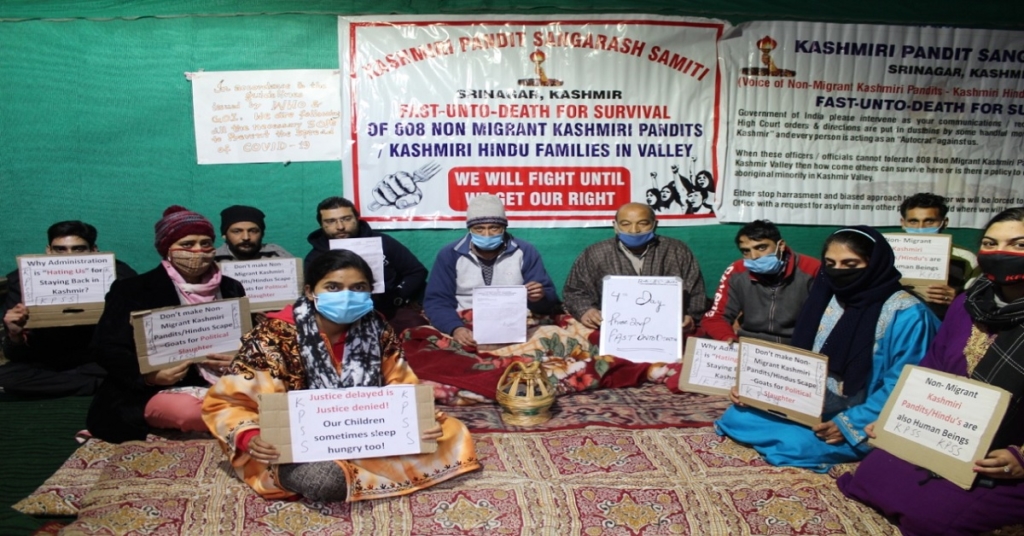On Wednesday, the fast-unto-death started by members of the Kashmiri Pandit Sangharsh Samiti (KPSS) entered its fourth day. KPSS president Sanjay Tickoo and youth activist Sandeep Koul have been fasting since Sunday.
In a statement released on the occasion, KPSS said that they “feel cheated and back stabbed by the Administration of UT for not adhering to their own promises and commitments that were expressively and verbally conveyed to us during the First phase of Fast-Unto-Death Pledge.”
CJP stands with the KPSS in seeking an immediate redressal of all grievances, jobs for 600 non-migrant KP youth in the Valley, a monthly cash relief package for the most needy families, and preservation of cultural and religious sites in the Valley. Join CJP in this campaign as we stand with the Kashmiri Pandit community in Jammu and Kashmir. To help us advocate for their safety and rights, please donate generously here.
The previous ten-day long fast was called off on September 30, 2020 after “Deputy Commissioner, Srinagar Shri. Shahid Iqbal Chowdhary, IAS on behalf of Administration assured in writing that the Charter of Demands will be discussed in a logical way and all the directions of the Hon’ble High Court read with Parliamentary Standing Committees recommendations and directions issued by the Ministry of Home Affairs, Union of India will be implemented on the ground zero to mitigate the long pending issues of the Non-Migrant Kashmiri Pandits / Kashmiri Hindus living in Kashmir Valley.”
However, when the administration reneged on its promises, KPSS went on a second hunger strike. “Though Hon’ble Prime Minister claims that his government stands for “Sabka Saath, Sabka Vikas, Sabka Vishwas” [Together, for everyone’s growth, with everyone’s trust] but due to the step-motherly treatment from the UT Administration it seems that this phrase excludes Non-Migrant Kashmiri Pandits / Kashmiri Hindus living in Kashmir Valley,” said KPSS.
At present there are 808 non-migrant Kashmiri Pandit families living in over 240 locations, mostly in makeshift facilities or refugee camps amidst poverty and squalor in the Valley. At least 150 of these are low-income families who fall below poverty line (BPL). Most struggle for basic expenses like food and medicine.
Security that was earlier provided to members of the community has now been withdrawn and Kashmiri Pandit families, especially vocal community leaders are now left to their own devices to protect themselves. Nearly 600 youth are unemployed. While they had earlier qualified for employment schemes of the government, a delay in implementation of the schemes led close to 100 of them becoming ineligible due to crossing age restrictions.
The KPSS is demanding not only financial aid, but also swift implementation of government employment schemes. CJP has been supporting KPSS, which is it partner organisation, in their quest for Kashmiri Pandits in the Valley.
The charter of demands is as follows:
- Extension of PM’s Job Package and apportionment of 500 posts / one job per family (preferably) criteria for 808 Non-Migrant Kashmiri Pandit / Kashmiri Hindu Families.
- DMRR&R deliberately delayed the process by more than four years as such give one-time age relaxation to all the over-age candidates’ w.e.f. 31.05.2016 (date of the judgment passed by Hon’ble High Court in OWP 1986/2013 titled Kashmiri Pandit Sangarash Samiti and others vs. Union of India and others)
- Providing of Accommodation to all deserving Non-Migrant families under PM’s Relief and Rehabilitation Package
- Extension / providing of necessary financial assistance to the 808 Non-Migrant Kashmiri Pandit / Kashmiri Hindu families living in Kashmir Valley
- Extension of benefits of Migrant Welfare Fund to the Non-Migrant Kashmiri Pandits – Kashmiri Hindus living in Kashmir Valley.
- Constitution of Nodal Agency between UT Government including Relief Department headed by Divisional Commissioner, Kashmir with one member from KPSS Core Committee.
- Protection, Preservation and Restoration of Temples and other religious institutions belonging to the religious minority in Kashmir Valley.

